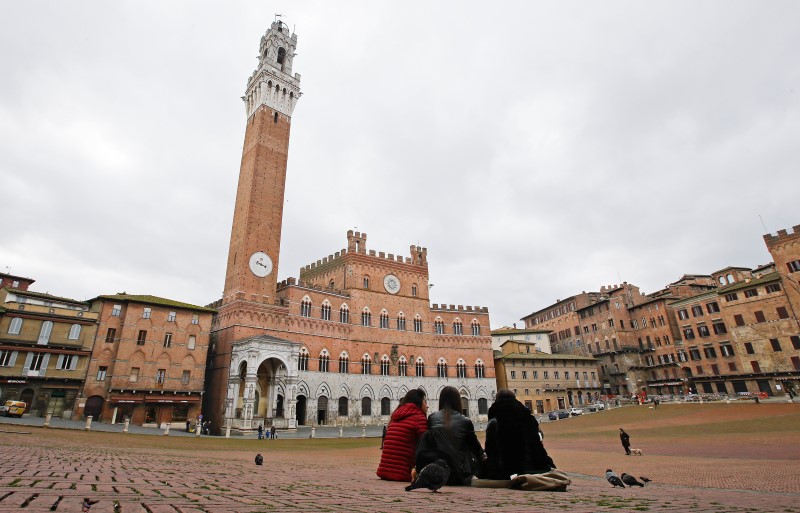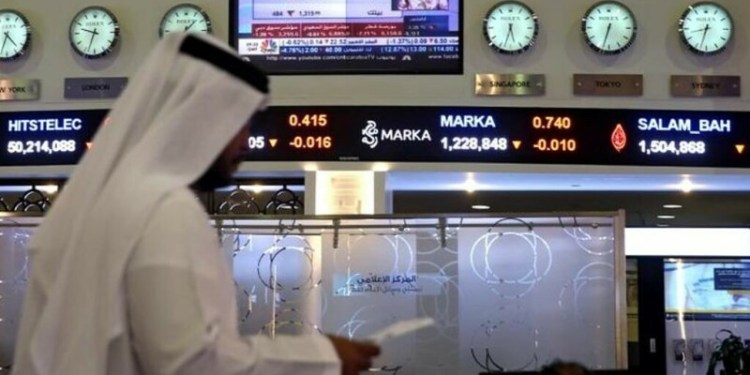 © Reuters. Italy’s Bond Slump Stirs Fading Memory of Euro-Area Debt Crisis
© Reuters. Italy’s Bond Slump Stirs Fading Memory of Euro-Area Debt Crisis(Bloomberg) — Investors could be forgiven for getting flashbacks to Europe’s debt crisis.
Italian yields surged to a seven-month high Wednesday on news that a putative anti-establishment government has discussed a 250 billion-euro ($300 billion) debt write-off from the European Central Bank. The bond rout in the euro-area’s third largest economy spilled over across the region’s markets — including those of Greece — and pushed the euro to this year’s lowest level.
For some, the volatility removed the veil of security that has seen money pour into peripheral euro-area bond markets in recent months amid signs of improving growth, fading political risks and the ECB’s unprecedented stimulus package. Even though an official from Italy’s League party denied plans for a write-down, talk of debt forgiveness is hurting confidence in a market already concerned about discussions over Greece’s bailout exit.
“This is a market rapidly losing faith in the stories they were telling themselves,” said James Athey, a money manager at Aberdeen Standard Investments, which manages 648.5 billion euros in assets. “Given the incredible lack of structural reform, euro-area debt issues were never that far from the surface.”
ECB Exit
European markets have been remarkably resilient to political risks over the past year, including elections in France and Germany, as well as a Catalan secessionist push in Spain. But the political flare-up in Italy comes at a time when the ECB is looking to extricate itself from its bond-buying program and take the first steps toward normalizing interest rates, even as the region’s economic recovery shows signs of faltering.
On Wednesday, German Chancellor Angela Merkel said governments must step up efforts to integrate the region, because the ECB’s backstop won’t last forever. Aberdeen’s Athey sees Italy’s 10-year yield spread over Germany potentially ballooning to 200 basis points for the first time since June last year, from around 150 basis points now.
Yields on 10-year Italian debt rose as much as 16 basis points Wednesday to 2.12 percent, the highest since October. Similar rates in Greece jumped 25 basis points to 4.37 percent, while those in Spain added five basis points to 1.41 percent. The euro fell below $1.18 to hit the weakest level since Dec. 18.
“This is a setback because, at a time where growth is decelerating somewhat and we are dealing with rising interest rates, having this additional risk of political premium is unwelcome,” said Alessio de Longis, a multi-asset money manager at OppenheimerFunds Inc. “Let’s not forget that the debt to GDP of Italy is higher today than in 2011 at the beginning of the crisis.”
There will only be a risk of contagion across euro-area debt markets if regional growth and economic sentiment deteriorates further, he said.
‘Best Short’
Political headlines out of Italy could fuel more market volatility in the short term, according to Andrea Iannelli, an investment director at Fidelity International, which oversees $324.5 billion.
“You do have the two largest parties in Italy being populist and having unorthodox policies and not agreeing on most of them — so it is bound to deliver volatility in the short term,” he said. “In terms of valuation there is still very little cushion protecting against further volatility ahead. Positioning is potentially crowded, and we are trading on headlines, which is never easy.”
The Italian parties’ rhetoric about debt-write downs is renewing worries about the longer-term for Patrick Armstrong, chief investment officer at Plurimi Investment Managers, which is holding off on shorting the nation’s debt “at the moment.”
“Should all the things the market is worried about go wrong, then it will be the best short ever,” he said.
Source: Investing.com




























